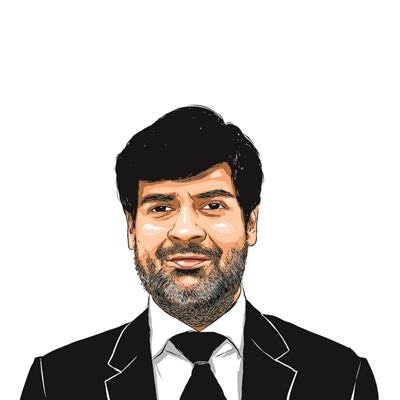Opinion The affection economy: Kinship, community, soft power — new currency of a new age
The future belongs to those who best understand that the currency for prosperity, influence and well-being at this time is care and belonging
 What differentiates countries and companies today is the networks they lead. (Illustration by C R Sasikumar)
What differentiates countries and companies today is the networks they lead. (Illustration by C R Sasikumar) Any epoch has an underlying currency that determines how power is distributed, partnerships are formed, and international relations are managed. In the distant past, it was fertile land. Then it was mineral resources. More recently, it has been demography, innovation or creativity that determined value, national purpose, and global power.
As old orders replace themselves, new economic forms emerge. The emergence of the information age gave us the data economy and the attention economy. In today’s world — decoupled, divided, atomistic — another term must receive our consideration: The affection economy.
Success today — in trade, in innovation, in the creation of value — depends upon how skillfully you curate a community, how effectively you kindle kinship, how carefully you nurture cohorts. Cohorts, kinships, communities: They are the building blocks of co-operation and economic success.
We have already seen glimmerings of this understanding permeate even the most rational, realist spheres of international relations. What, after all, do we mean when we speak of “like-minded” nations? Like-mindedness creates commonality. It creates a shared purpose and ensures a common direction. It means trust endures even through the temporary turbulence of the sort that the American president is currently inflicting.
The affection economy has visible effects on the corporate world as well. Both companies and countries compete for affection; they expand their footprint through a dedication to empathetic engagement and care.
The smartest places, like Dubai, have designed entire demographic and growth policies around curated communities. Visas are offered apparently for commercial reasons, but actually to create a golden cohort of affection. The purpose of their national policy is to make people embrace Dubai. Like Dubai, fly Dubai, buy Dubai, live Dubai.
The UAE may be the perfect exemplar, but it is not the only one. Other countries are constructing or have constructed soft power strategies around communities of interest. Germany is one; Australia and New Zealand, too — and of course Singapore.
Corporations have done it. In India, the stakeholder capitalism that Dhirubhai Ambani fostered — filling stadiums with tens of thousands of co-owners of the Reliance enterprise — offers an analogy. It percolates to the company’s thinking even today, with the equity community being succeeded by the data equity community, taking broadband to the bottom of the pyramid.
The US is a special case. Companies like Apple have built on that foundation to create global production and consumption networks that look to California for inspiration. The federal government has largely let the American private sector run the affection economy.
It is this stored-up affection capital that President Donald Trump is running down so speedily. What differentiates countries and companies today is the networks they lead. It has long been taken for granted that China lacked soft power, that it was respected but not loved. In the 21st century, this placed a hard ceiling on its rise. The US had no such hard ceiling till it constructed one for itself.
How has the affection economy come to dominate? The flattening of the world by digital technology has had something to do with it. It replaced organic connections created by neighbourhoods and workplaces with the more diffuse, detached and delicate bonds that are created online.
But this and individualisation have been in progress for decades. Political scientist Robert Putnam developed a theory in the 1990s of “social capital”, explaining how person-to-person connections were foundational for modern America. In his book Bowling Alone, he argued that this social capital was on the decline, taking civic consciousness with it. This would cause problems, as the community was the true determinant and differentiator of success. Francis Fukuyama demonstrated in his book Trust (1995) how social capital created trust within nations, and how trust led to stability and economic growth.
Putnam is not surprised that the desolation of communities has caused the rise of extreme movements. Political activist Steve Bannon has publicly said that Bowling Alone inspired him and others to identify their political movement as a cure for the social isolation felt by many Americans. This phenomenon is being replicated around the world: Individualistic societies are abandoning their lonely members to such extreme communities. These groups and movements may be only a dark imitation of the true solidarity and fellowship that creates trust, but they are still communities for those who have no other.
The final push that transformed global society would have to be a global event. Covid provided that impetus. It was a period when isolation deepened, the workplace became irrelevant, and the appeal of the solo actor was enhanced. Today, the digital nomad and the lone-wolf terrorist are two sides of the same coin.
The future will belong to those who best understand that advancements in the technology and economic realms have brought human collectives back a full circle socially. We have indeed returned to a primal state, where communities matter more than anything else. The currency for prosperity, influence and well-being at this time is care and belonging. Prime Minister Narendra Modi read this right when he spoke of vasudhaiva kutumbakam: One Earth, One Family, One Future. It is indeed the time for a return on and to affection.
The writer is president, Observer Research Foundation



